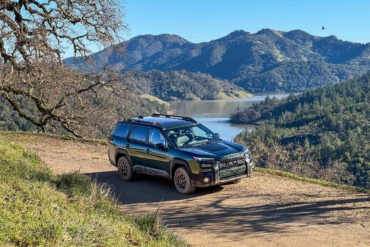Poseidon AmphibWorks believes its vehicle has the potential to impact transportation, recreation, and search-and-rescue operations.
For most of the long history of amphibious vehicles, they have represented a James Bond level of luxury. Often regarded as extravagant and unnecessary innovation, they usually seem like a toy for the uber-wealthy.
But Poseidon AmphibWorks brings a very different outlook.
The San Diego-based startup sees amphibious vehicles as a critical part of adapting to a world transformed by climate change. To that end, the brand may have created a vehicle unlike anything that has come before — in real life or science fiction.
If the company’s claims hold water, its Trident LS-1 prototype is currently the only amphibious, hydrofoil-enhanced, electric vehicle anywhere. In other words, it doesn’t need gas, drives on both land and water, and can travel up to 35 mph with the hydrofoils on water.
With that much flexibility in transportation, the Trident is uniquely ambitious.
“After prototypes are tested within the next 5 years and services are established in main coastal markets around the world, we hope to have over 1,000 vehicles sold globally, with many more exciting developments in the horizon beyond,” co-founder and CEO Steve Tice said in a press release.
Trident LS-1 Looks Toward a Wetter World
Poseidon AmphibWorks recently finished its first fundraising campaign on the startup-focused site Start Engine. While the company only pulled in $21,205 from 27 investors, there’s reason to believe consumer interest will increase in the coming years.
The global amphibious vehicle market was worth $2.91 billion in 2021, according to Expert Market Research. That number is expected to reach more than $4.71 billion by 2027.
AmphibWorks’ company leaders believe demand for amphibious vehicles will rise with the oceans.
Their marketing frequently points to increasing sea levels, which varying estimates put at 1 to 8 feet by either 2050 or 2100. With flooding from hurricanes becoming an increasing issue — underscored by the recent destruction in Florida — consumers will be looking for solutions, the company said.

“Having an amphibious vehicle that can serve as a household’s recreational vehicle could become a lifesaver when the unexpected happens,” AmphibWorks wrote. “However, current vehicles within the market offer sub-optimal marine performance and are only legal for off-road use.”
Another big selling point: The Trident doesn’t need a trailer to haul or a boat ramp to reach the water. That means commuters could use it to avoid heavy traffic in coastal cities like San Diego, CEO Steve Tice said.
It’s also a lot more fun to use as a recreational boat when you don’t have to worry about boat ramps, Tice said.
“For boats, there’s less pollution of the water. There’s less noise,” Tice said. “Prices are still ridiculous for most electric boats. And the range isn’t great. But when you put hydrofoils on, everything changes.”
Poseidon AmphibWorks Trident LS-1: Features & Details
Poseidon AmphibWorks designed the Trident LS-1 to function as a “triple threat.” They see its potential not only in commercial and recreational sales but also in search-and-rescue operations.
Some of those additional “threats,” however, will come in future models. Eventually, the company hopes to produce a luxury model (LS-2) and a Search-and-Rescue model (LS-3), among others.
Poseidon has spent more money on developing the technology than a spiffy design and expects the outward appearance of the vehicle to change drastically over the next year. The current prototype, however, already aims for several unique features, like being legal to drive on the highway and not needing a boat ramp.

As a car, the Trident’s battery will have a combined highway/city range of 200 miles. It will go 0-60 mph in 5 seconds, reach a top speed of 100 mph, and will have all-wheel drive. Perhaps most significant, it can be towed without a trailer.
As a boat, its projected range — using the hydrofoils — should be about 60 miles. It can cruise at 22 to 35 mph with the hydrofoils or at 15 mph without them. The foils will also handle waves up to 4 feet high.
Overall, this electric vehicle comes with a modular deck, a “fast-charging” battery, as well as seatbelts and roll bars for crash protection.
Company leaders hope to sell the vehicle for about $95,000 — about 20% of which will be profit.
While cheaper than most electric boats — or many fully converted RVs — that’s still a big chunk of change. To make the Trident successful, Tice knows the company’s real challenge lies in getting people to see the value.
“How do you justify a $100,000 vehicle? How do we convince a mass audience that that much money can produce enough value for the customer?” Tice said. “That’s where we’re at.”
Learn more about the Trident LS-1 on the company website or Facebook.








